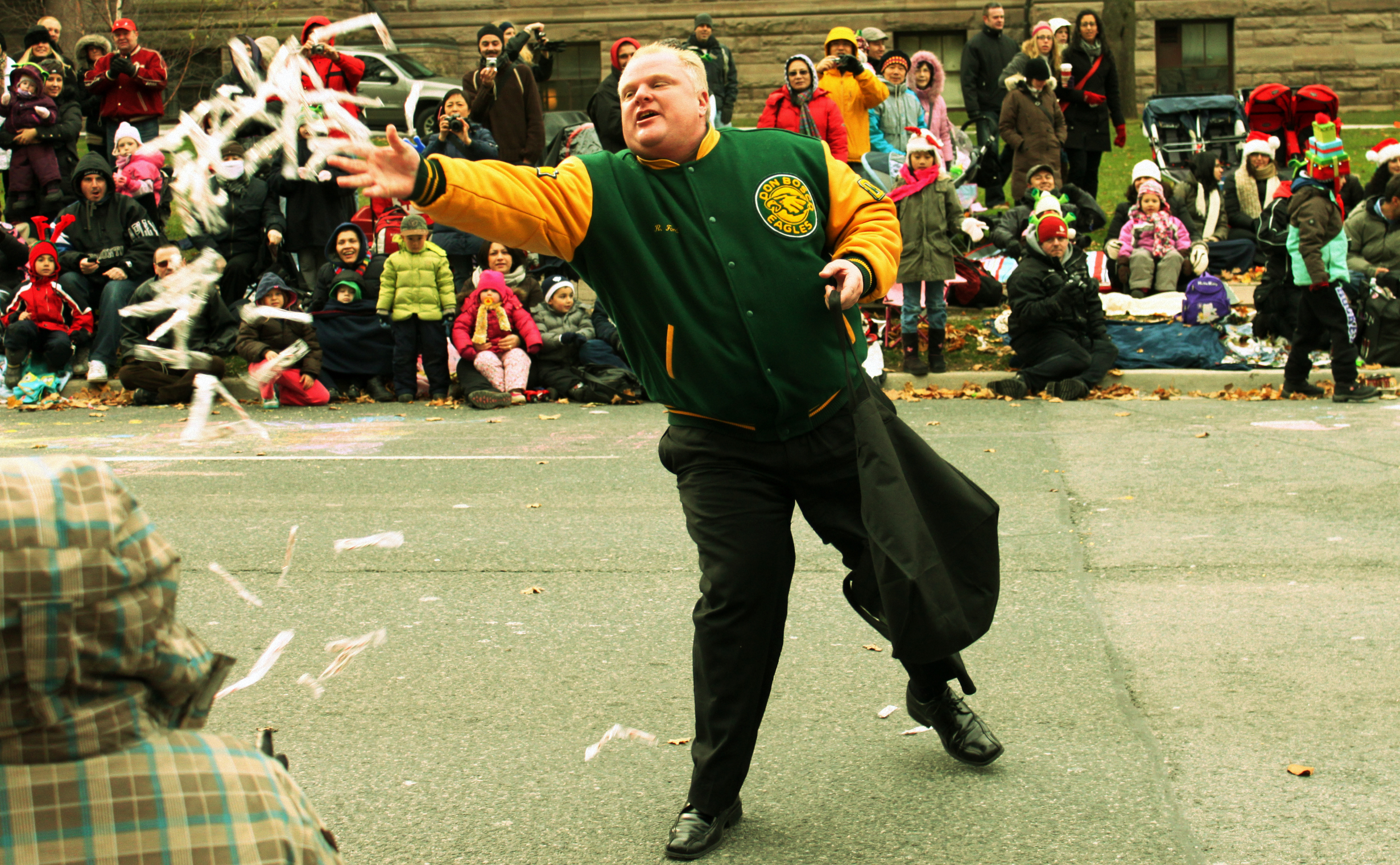You can change the conversation. Chip in to rabble’s donation drive today!
There was an editorial cartoon depicting Rob Ford falling from the sky, with Steven Harper remarking to Mike Duffy, “We need something really big to take the focus off you…” While we have little sympathy for the mess Mr. Ford has created for himself, we cringe at the fat-shaming in the cartoon, as well as in some of the commentaries on his behaviour.
Even though there continue to be some comments that ridicule him about his weight, they are a minor part of the tsunami of public discussion on his series of scandals. Ford has certainly been confronted en masse about his capability to serve as mayor of Toronto, his refusal to step down and subsequent run for re-election. Some have taken him to task on his bullying behaviours, homophobic comments and drunken threats of violence.
Fair enough. But, what if Ford were a woman? Not only would she be subject to a barrage of insults, such as “cow,” “pig,” “lard-ass” and “thunder thighs,” but the barrage would be coupled with sexist and misogynist accusations, as well.
Doubling the power of language to insult, demean and dehumanize, epihtets like “bitch,” “slut” and “whore” would also likely be prominent in responses that attempt to put her “in her place.” Plus, social commentary about her body would be extended to her character: lazy. Weak-willed. Undisciplined.
She and those like her are even blamed for perilous problems such as climate change. In 2009, for instance, headlines blared that “fatties cause global warming. After all, fat people drive larger cars to haul their extra weight around and extra fuel is used to transport all the food they eat. Right? Wrong. These ideas are utter nonsense from a research standpoint, and also disturbing because, evidently, no one else has any responsibility. Fat people are easy targets for demonization, these days.
Less ridiculously and arguably even more powerfully, the weight loss industry profits from, perpetuates and enables fatphobia and fat-shaming. Worth an estimated $6 billion in Canada alone, diet food and drinks, weight loss programs and bariatric surgery send the collective message that fatness is gross.
There may be readers thinking, “Well, fat people do eat more and are less active, and if they would just lose weight, they wouldn’t be so ridiculed.” These assumptions are common and are not remotely based in fact. Indeed, the overwhelming evidence illustrates that dieting is physically and emotionally torturous. Very few people keep the weight off, and the cycle of losing and gaining is more harmful to one’s health than keeping a steady weight. The role of media in promoting only one standard of health and beauty for women — thin and able-bodied — doesn’t seem to matter.
It’s not that Rob Ford is exempt from fatphobic vitriol. Clearly, he isn’t. The point is that if he were a woman, the press and social media would have a heyday over her physical appearance and the scandals that have attracted worldwide attention would be eclipsed by fat-shaming comments. Ridicule would be expressed with a perverse sense of self-righteousness and entitlement, as is typical of bigotry, void of even a single moment of sober second thought.
Film critic Rex Reed should have taken such a moment. In his review of Melissa McCarthy’s film Identity Thief, he referred to her as “tractor sized” and as a “hippo.” In social media, Adele is consistently subject to scrutiny of her body. Male entertainers are, no doubt, occasional recipients of fatphobic ignorance, too, but not so much that their careers take a back seat to their physical appearance. This is just another form of sexism.
Fortunately, McCarthy and Adele have achieved success despite the bigotry of the Rex Reeds of the world. Unfortunately, legions of girls and women have witnessed and then internalized hate for what they understand to be their imperfect bodies. We do not minimize the pain that some boys and men experience because of such ignorance and hate, yet it is important to acknowledge that fatphobia is one of the most powerful forms of bullying among girls both in schools and online.
It’s easy to lob insults at those we deem inferior and deserving of contempt. It’s also tediously unoriginal.
A wide variety of minority groups have had to tolerate the untamed bigotry of others for decades, even centuries. Just ask people who are gay, lesbian, transgender, Black, Jewish, Indigenous, mentally ill, mentally challenged, physically disabled, poor and working class, among others. It’s the same sad, tired pattern over and over again, which is that those in a perceived position of superiority feel entitled to express, in person or online, their contempt for those who are different from them. If it isn’t one group who’s a target, then it’s another.
Is there a solution to fatphobia in society and fatphobic bullying in schools? Yes, and one place to start is for each of us to look in the proverbial mirror to learn about and challenge our negative, misguided and harmful attitudes, assumptions and beliefs about fatness.
Dr. Connie Russell is a social justice educator specializing in environmental issues and body diversity.
Dr. Gerald Walton is a social justice educator, specializing in diversity in society and education in all aspects, including body size and shape.
Photo: flickr/Jason Verwey



